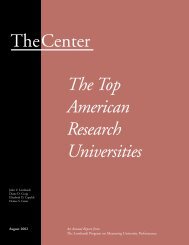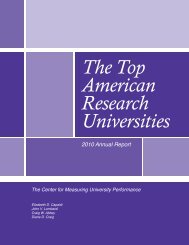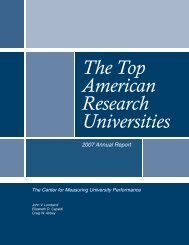The Top American Research Universities - The Center for ...
The Top American Research Universities - The Center for ...
The Top American Research Universities - The Center for ...
You also want an ePaper? Increase the reach of your titles
YUMPU automatically turns print PDFs into web optimized ePapers that Google loves.
<strong>The</strong> <strong>Top</strong> <strong>American</strong> <strong>Research</strong> <strong>Universities</strong><br />
Other rankings, more akin to the US News variety, seek<br />
to bolster general interest publications with rankings of<br />
domestic and international universities. Indeed, the ranking<br />
of international universities, called by their British term of<br />
league tables, has become a major enterprise in its own<br />
right, with the World University Ranking, Times Higher<br />
Education Supplement as prime examples. <strong>The</strong> popularity<br />
of the Chinese Shanghai Jiaotong University Academic<br />
Ranking of World <strong>Universities</strong> rankings, a non-commercial<br />
enterprise, clearly demonstrates the international popularity<br />
of ranking lists. (See the excellent summaries of ranking<br />
systems at (http://www.ihep.org/<strong>Research</strong>/<br />
rankingsystemsclearinghouse.cfm and<br />
http://www.library.uiuc.edu/edx/rankings.htm)<br />
<strong>The</strong> international rankings suffer from the common<br />
problems of all general purpose rankings: inconsistencies<br />
of data and imprecision of definitions. Few countries<br />
produce easily comparable data on university per<strong>for</strong>mance,<br />
and most international rankings find themselves limited to<br />
counts of publications, citations, and internationally visible<br />
scientific prizes. While these may be useful measures<br />
of some <strong>for</strong>ms of research productivity and institutional<br />
distinction, the validity of linking publication and citation<br />
counts by author to the distinction of universities is<br />
questionable. Even with the greatest care in the selection<br />
of publications and the statistical processes used to count<br />
and verify authors and citations, these surveys often<br />
misrepresent quantity <strong>for</strong> quality. <strong>The</strong>y may misidentify<br />
some significant authors and often ignore the different<br />
publication styles and citation conventions of various<br />
disciplines and journals. <strong>The</strong>se problems can render such<br />
rankings difficult to interpret.<br />
In the United States, the National <strong>Research</strong> Council’s long<br />
awaited survey of graduate programs continues to struggle<br />
with data definitions, statistical issues associated with<br />
calibrating the data collected, and a concern that the<br />
resulting ef<strong>for</strong>t will be out of date when published and<br />
overly reliant on reputational issues that have long plagued<br />
US News and similar survey based rankings.<br />
From our perspective, all of this activity in the ranking<br />
world is good news even when we are not always<br />
enthusiastic about the results. Most rankings have some<br />
value <strong>for</strong> some observers interested in some characteristics<br />
of higher education institutions. No ranking, including this<br />
one, provides a holistic picture of the full value or total<br />
quality of any institution in all of its many manifestations.<br />
<strong>Universities</strong> serve many audiences, and the endless and<br />
foolish search <strong>for</strong> a universal ranking that will consolidate<br />
into one number the many virtues of institutions of<br />
substantially different characteristics and value to each<br />
of their wide variety of constituencies consumes too much<br />
time and energy with too little result. Some universities<br />
may well be good at everything, some exceptional at some<br />
things and not so good at others, and some not engaged<br />
in the national or international competition at all. <strong>The</strong><br />
pursuit of a single number to represent excellence in these<br />
consolidated rankings, whether US News or the Times<br />
World University Ranking, generates a set of false<br />
expectations and beliefs.<br />
If we imagine that the annual changes in university<br />
rankings highlighted by such publications reflect a real<br />
change in university per<strong>for</strong>mance, we can find ourselves<br />
engaged in a self-defeating ef<strong>for</strong>t to manipulate the data<br />
to make us look better than we are. We can find ourselves<br />
pursuing the false god of ranking instead of the true goal of<br />
institutional improvement in a specific and definable way.<br />
When, as is the case with US News, the vaguely defined<br />
notion of reputation becomes a significant factor in the<br />
rankings, we can find ourselves spending money on<br />
advertising to raise our name recognition among those<br />
who vote in the surveys instead of investing in the real<br />
work of the university. We can imagine that our football or<br />
basketball success, which creates endless publicity, is a<br />
good substitute <strong>for</strong> the work of the faculty and students in<br />
the academic enterprise that receives much less attention.<br />
Similar misuse of these publications can mislead us.<br />
We might believe that an increase in rank indicates a real<br />
improvement rather than a statistical fluke related to<br />
complex calculations in the system or the consequence of<br />
our immediate competitors having a bad year. We might<br />
fool ourselves into thinking we have actually improved<br />
when in fact we only benefited from a numerical anomaly.<br />
Most academics know all this, but their public audiences<br />
do not always understand or care. <strong>The</strong>y want to see their<br />
college or university rise in the published, highly advertised<br />
rankings. Especially in the public sector, alumni and friends<br />
of the institution will pressure their legislatures, their<br />
boards of trustees, and their administrators to insist on<br />
following the annual rise and fall in the rankings appearing<br />
in one of these popular publications as if they represented<br />
2008 Annual Report<br />
3








